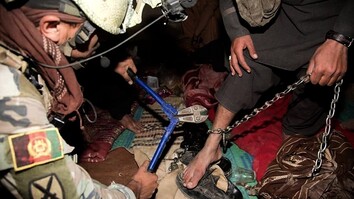LASHKARGAH -- After a series of operations conducted by Afghan forces, many civilians freed from Taliban captivity are telling harrowing stories about their experiences, including torture, starvation, robbery and death sentences that only their liberation prevented.
On September 23, Afghan forces raided a Taliban-run prison in Maidan Wardak Province, freeing eight prisoners, including six Afghan security personnel, Voice of America reported.
In another operation August 2, Afghan commandos from the 7th Special Operations Kandak freed 61 civilians, including elderly men and young children, who were detained in a Taliban facility in Kajaki District, Helmand Province, the provincial government said in a statement.
In May, security forces freed at least 105 civilians, including women, from a Taliban prison in the same district, Afghanistan's Special Operations Corps said in a statement.
![Eight rescued prisoners, including six Afghan security personnel, are photographed upon their arrival at Camp Dahlke, Logar Province, September 23. [CENTCOM]](/cnmi_st/images/2018/10/01/14702-maidan_2-585_329.jpg)
Eight rescued prisoners, including six Afghan security personnel, are photographed upon their arrival at Camp Dahlke, Logar Province, September 23. [CENTCOM]
![Afghan security forces celebrate the rescue of eight prisoners from a Taliban-run prison in Maidan Wardak Province September 23. [CENTCOM]](/cnmi_st/images/2018/10/01/14703-maidan_3-585_329.jpg)
Afghan security forces celebrate the rescue of eight prisoners from a Taliban-run prison in Maidan Wardak Province September 23. [CENTCOM]
![Civlians freed by Afghan security forces can been seen in this picture on August 7 at Camp Shorabak, an Afghan National Army (ANA) base near Lashkargah, Helmand Province. [Zia Samar]](/cnmi_st/images/2018/10/01/14742-Prisoners-585_329.jpg)
Civlians freed by Afghan security forces can been seen in this picture on August 7 at Camp Shorabak, an Afghan National Army (ANA) base near Lashkargah, Helmand Province. [Zia Samar]
Holding civilians captive
Saifullah, 48, a resident of Marjah District, Helmand Province, is one of the prisoners whom Afghan commandos freed in Helmand August 2.
The Taliban had seized him in May after finding government officials' phone numbers on his cell phone.
"I had the telephone numbers of [Afghan] government officials, and my brother works with police forces," he told Salaam Times. "They [the Taliban] imprisoned me in Marjah for 15 days and then locked me up in a prison in Musa Qala District for another two months where I could not differentiate between day and night."
After those three months, the Taliban held him in Kajaki District until the commandos came.
"The Taliban told me, 'You have three more days, and then three men will come and speak about three things with you and will then release you.' However, some of my friends told me that [the Taliban] would execute [me]."
"I did not know if I would have lived any longer," Saifullah said. "The Taliban robbed the prisoners too, and then they released some of them."
He praised Afghan security forces for releasing him and other innocent civilians from captivity.
"I am just as happy with the action of the Afghan forces as if I had gone on the Hajj," he said. "The joy I would have felt on the Hajj cannot match the joy I felt knowing that I would live again -- I can't express my happiness in words."
Tortured, sentenced to death
Two days before the Taliban were about to execute another prisoner, Raz Mohammad, 27, Afghan forces released him and five other civilians, as well as four police officers, from a Taliban prison in Musa Qala District, Helmand Province, August 7.
The Taliban kidnapped him while he was on his way from Nimroz Province to Helmand to visit his uncle's family, he told Salaam Times.
"The Taliban beat us, did not give us food and water, robbed us [and] treated us very cruelly," he said.
"When Afghan forces broke into the jail, we became as happy as if a baby had been born," he said. "It was only two days before my scheduled execution."
Mohammad Sharif, 32, a resident of Marjah District, said the Taliban grabbed him April 10 while he was on his way home.
"I was imprisoned for four months in a Taliban prison in Musa Qala," he told Salaam Times. "The Taliban did not give us food and beat all of us."
"When my mother learned of my imprisonment, she became ill, which continued for four months," he said. "She could not eat, but she resumed eating food after I was released."
Destroying Taliban prisons
"The Taliban have imprisoned old men, children and women and mistreat them," Omar Zwak, a spokesman for the Helmand provincial governor, told Salaam Times.
Afghan security forces are searching for additional Taliban prisons so they can free innocent civilians, he said.
"Afghan forces are trying to find and destroy other Taliban prisons," Zwak said, adding that "Afghan forces have released hundreds of prisoners [in recent months], including women and children."
"We storm prisons run by the Taliban wherever they are and release civilians from their cruelties," Maj. Abdul Qadeer Bahadurzai, a spokesman for the 215th Maiwand Corps of the Afghan National Army, told Salaam Times.
"Afghan commando forces have so far broken into dozens of small and big Taliban-run prisons, freeing women, children and the elderly," he said.
"According to Sharia law, the Taliban are not allowed to imprison the innocent or to treat them cruelly," Mawlawi Mohammad Yunus Musawi, a religious scholar at the Bibi Zahra Shia mosque in Lashkargah, told Salaam Times.
"They [the militants] are rebels against a [legitimate] government, and they never have the right to imprison [civilians]," he said. "The Taliban always commit crimes like extorting money from the [local] residents and killing them. This is not allowed in Islam."







Wish u all the best Afghan Tigers (army) and Salam Times team for providing accurate reports.
Reply1 Comment